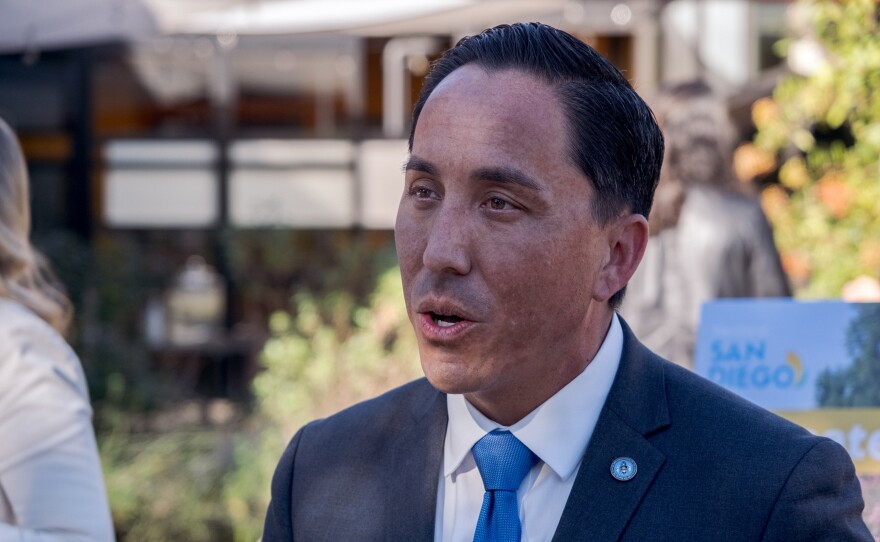The San Diego City Council Monday heard the presentation of Mayor Todd Gloria's proposed Fiscal Year 2024 $5.12 billion budget, with the body's members focused on equity in various departments and addressing homelessness.
No action was taken Monday, but dozens of members of the public and the city councilmembers were given chances to speak, with concerns ranging from the city's cannabis equity program, filling potholes, getting homeless San Diegans off the streets to city arts funding.
Beginning next week, the council's Budget Review Committee will meet for three weeks during the day, along with 6 p.m. meetings with the full council on May 3 and 10. A revised budget is scheduled by May 18.
Gloria's "Getting It Done" budget is an increase over 2022's "Ready to Rebuild" $5 billion budget, which the mayor said was intended to maintain city service levels and expand programs in certain city needs.
"We built a strong foundation for improving the infrastructure and overall quality of core city services in my administration's first two budgets," Gloria said. "This coming fiscal year, we're focused on efficiently and effectively delivering on those investments and making substantial progress toward ensuring that, operationally, we're the well-functioning city government that San Diegans expect and deserve."
Among the proposed budget's additions is $24.5 million to maintain and operate the nearly 70% growth in shelter bed capacity under Gloria's administration. Along with this, the budget calls for an additional $5 million to further expand shelter capacity in the coming year, including funding for a Safe Sleeping program; $2.3 million for rental assistance for San Diegans who are at risk of losing their housing; and $1.4 million in funding to support new positions and vehicles to remove waste from the public right-of-way in areas most heavily affected by encampments.
Councilman Kent Lee recognized the significant increase in shelter beds during Gloria's term — a 70% growth, the mayor's office touts — but also acknowledged the high cost of housing which can force people from shelter into unstable housing or onto the street.
Gloria's budget also allocates nearly $140 million to street repair/resurfacing, expected to enable the city to resurface 157 miles of streets, including both full overlay and slurry seal.
Councilwoman Vivian Moreno reminded Gloria's office that particularly in Council District 8, which she represents, and district 4, many miles of unpaved, unimproved alleys and roads exist and should take higher priority than they do currently.
According to the mayor's office, another $38.6 million is tabbed for parks, playgrounds and green spaces. Projects earmarked for that funding include Riviera Del Sol Neighborhood Park, Mountain View Teen Center, Paradise Hills Community Park Dog Park, Olive Street Mini Park and Salk Neighborhood Joint Use park, amongst others.
Last among the major proposed additions is $2.2 million to fund 10 Police Investigative Service Officers and 11 other civilian positions to "support administrative functions more cost-effectively for the Police Department, freeing up sworn police officers for patrol and responding to calls for service," a statement from Gloria's office reads.
"This budget will allow the San Diego Police Department to hire more professional staff to augment staffing, bring back Smart Streetlights to support investigations and address the proliferation of illegal drugs in our communities," said Police Chief David Nisleit. "SDPD is grateful for the investment by Mayor Gloria and the City Council to assist us in keeping San Diego one of the safest big cities."
A woman spoke at Monday's meeting about her son, who died from a fentanyl overdose, demanding the city take action to combat opioids in the community. Councilwoman Marni von Wilpert later responded with tears in her eyes about how important that issue was to her personally.
Gloria said he and his administration crafted the budget to avoid creating departments and programs which would need to be cut if an expected revenue dip arrives in the next several years. It has also been developed with a view toward equity and the intention of providing similar services to the city's many neighborhoods.
"Budgets are statements of priorities and determine allocations of resources, making the budget-development process a great opportunity to evaluate how we might be favoring one neighborhood or group of people over another in ways that contribute to disparities," said Kim Desmond, the city's chief race and equity officer. "That work is happening now. It will take many cycles to eliminate disparities that in some cases have grown over generations, but this budget is a great first step."









